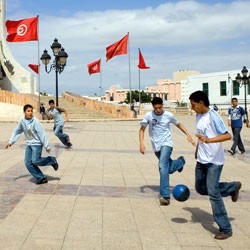Twenty-year-old Maroua says that not long ago, she spent her days largely alone. When her family gathered for dinner in their home outside Tunis, she took food into her room and ate by herself in front of the TV or computer.
Now, she takes her seat at the table alongside her parents and younger siblings.
“I join them at the table to eat, or just to talk. I sit down with them, we watch TV together and joke around,” Maroua says. “None of that was happening before. I was a very closed person, I never talked to my family.”
Maroua attributes this change to the support she received from counselors from the ETTYSAL program, who worked with her and her family over the course of a year to change negative behaviors and strengthen family cohesion.
Meaning “reaching out” in Arabic, ETTYSAL was an 18-month pilot program funded by the U.S. State Department and implemented by Creative Associates International. Its goal was to build resilience to violent extremist organizations that are exploiting feelings of resentment, marginalization and desperation among youth.
The ETTYSAL model centers on strengthening the entire family system, building protective factors and reducing risk factors — such as antisocial tendencies — that can make youth more vulnerable.
“I thought of committing suicide because of how depressed and isolated I felt. I was unable to trust people. I never talked to my mother about my problems, I never got involved in the family. I was just alone in my own corner,” Maroua says. “I feel I am a new Maroua. Now, I have hope.”
Building resilience, family first
With its team of 12 trained family counselors, the ETTYSAL pilot reached 100 at-risk youth in the communities of Manouba and Kasserine, hot spots for violent extremist recruitment.
The program was the first of its kind in Tunisia. But its family-centered approach has been tried and tested in a different context: building resilience to gangs and violence in Latin America and the Caribbean. Creative, with support from university partners, adapted this evidence-based model to the Tunisian context.
A diagnostic called the Youth Services Eligibility Tool (YSET), first developed in Los Angeles, was adapted to measure youth risk across a total of 12 factors at an individual, peer and family level, including impulsive risk-taking, weak parental supervision, religious extremism and radicalization of friends and relatives. The adapted tool was applied to 600 youth in Tunisia, and 100 presented six or more factors and were considered high-risk.
Maroua’s scores placed her in a high-risk category.
Counselors worked with families and one-on-one with youth to address these risk factors and brought youth together for group activities such as plays and trips to historical sites to build positive peer influences and a sense of connection to their communities.
After a year of counseling and intervention, the youths’ risk levels were again assessed using the YSET. The results of the program were clear: 95 percent of youth reduced their number of risk factors to below six by the end of the program, meaning they are no longer considered at-risk.
Creative’s Citizen Security Practice Area Director Enrique Roig, Project Director of ETTYSAL, says the program’s success shows that for youth — regardless of where they live — strengthening the family system reduces risky behaviors and increases protective factors.
“ETTYSAL demonstrated that reinforcing the family as a protective factor is an effective method of secondary violence prevention, whether we’re talking about gangs or violent extremist organizations,” Roig says. “In Tunisia or Honduras, stronger families build more resilient youth.”
Supporting youth to thrive
Beyond the data, the project’s impact can be seen in the behaviors, attitudes and homes of Tunisian youth like Maroua.
When ETTYSAL counselors first came to her house, Maroua thought they were wasting their time and hers. But their support, and the hours she started spending at the local youth center, changed her mind and her perspective on life.
“I learned to trust myself. I learned to speak up and not be afraid of talking to people. Now I meet new people, I learned how to live in this world with confidence in myself,” she says. “And I learned to give myself second chances when I make mistakes. I am brave.”
Maroua says that her challenges haven’t disappeared — she is still without a job, and only has a seventh-grade education. But she has learned how to better handle those challenges and lean on her family for support.
“I teach my brothers and sisters what I’ve learned here. I have benefitted so much, and I tell my siblings not to follow the way I was living before,” she says. “They should thank God that they are Tunisian, trust themselves and look ahead to tomorrow.”

